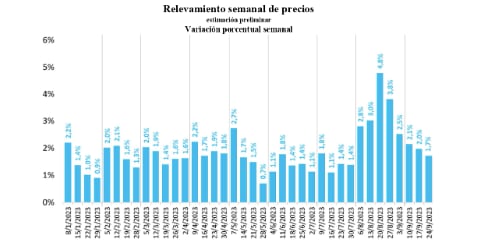According to the Argentine government, in the third week of September, inflation was 1.7%. This data is a Slow down Compared to last weekly data, this 2.1 percent.
The data comes from a weekly survey conducted by the Economic Policy Secretariat. The break is rising for the sixth consecutive week Prices.
It should be noted that this official alternative measure to INDEC’s CPI (Consumer Price Index) is registered. PASO 2023 peaked 4.8% in the week after the electionThere was a spike in prices after a sudden hike in the official exchange rate of 21.8 percent.
At the same time, the economist led portfolio Gabriel Rubinstein He shared a graph showing the evolution of prices and how these last five weeks have recorded a downward trend. It should be noted that the lowest inflation week so far in 2023 was at the end of May at 0.7 percent.

This survey is based on price reality Supermarkets and other marketing channels represent a basket of food, beverage, cleaning, personal care, home appliances and apparel products.
An online survey of goods and services with nationally regulated prices is carried out taking into account published prices on various automobile and pharmaceutical websites.
In addition, valuations are adjusted to account for gaps through the marketing channel in products such as food and beverages in underweight products, and own valuations are made.
Inflation is a general and sustained increase in the prices of goods and services in a country over a period of time. In Argentina, this phenomenon has been a constant feature in recent decades, with annual rates often exceeding 20% and reaching higher levels. Although inflation is a problem that affects many economies around the world, it has been particularly damaging in Argentina.
Several factors contribute to inflation in Argentina, which has already hovered above the 100 percent annual threshold. One of the main factors was the chronic fiscal deficit, which led the Alberto Fernández administration to print money without support to finance public spending. An increase in the amount of money in circulation causes an increase in prices without an oversupply of goods and services in the absence of investment in production and infrastructure.
Election-year political uncertainty and lack of consensus on sound economic policies compounded the inflation problem. Changes in government administration and economic policy decisions undermined the confidence of investors and entrepreneurs, disrupted long-term investment and were often unpredictable.
Inflation has a significant impact on the daily lives of Argentines. The purchasing power of the currency continues to decline, meaning that citizens have to spend more money to buy the same goods and services. This particularly affects those on fixed incomes, such as retirees and salaried workers, whose salaries are not always adequately updated in line with inflation.
The Argentine government implemented a series of measures, such as price controls and wage contracts, to combat inflation. However, these approaches are insufficient to control inflation in the long run. The new government, which will take office on December 10, will require deep structural reforms to address this complex problem, such as reducing the fiscal deficit, encouraging investment in manufacturing, and promoting political and economic stability.
:quality(85)/cloudfront-us-east-1.images.arcpublishing.com/infobae/EC7LCBSFAZFBNJECHKFTGLQI3I.jpg)
